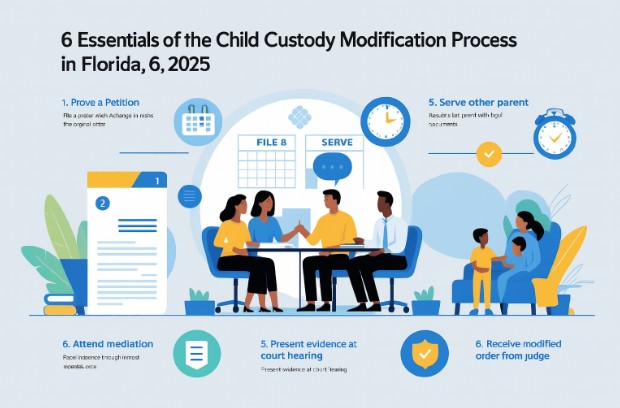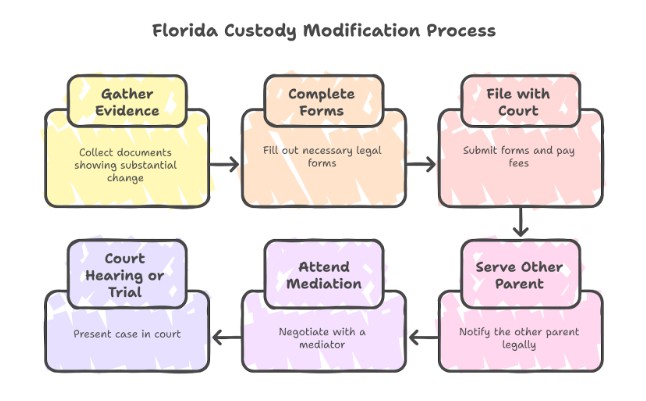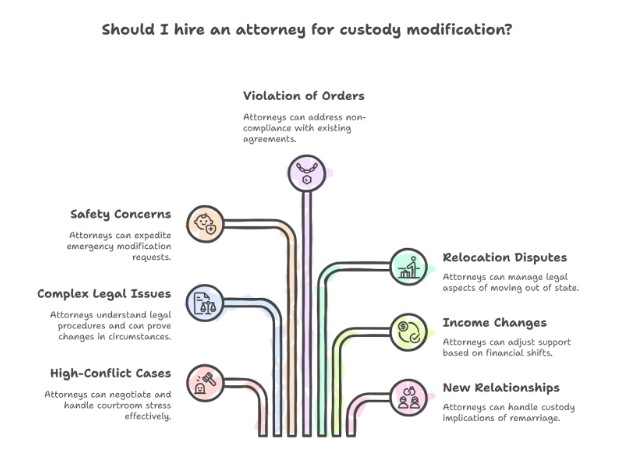How to Modify Child Custody in Florida – Step-by-Step Guide 2025

Changing a child custody arrangement in Florida means following specific legal steps. Parents must prove a substantial change in circumstances since the original custody order was issued before a Florida court will consider modifying the arrangement.
The family law system puts the child’s best interests first when evaluating these requests.
The modification process starts by filing a supplemental petition with the same family court that issued the original parenting order.
Parents need to understand what constitutes a substantial change, gather relevant documentation, and navigate the court system effectively to increase their chances.
This guide walks through the key steps for requesting custody modifications, common scenarios that justify a change, Florida-specific filing requirements, and potential costs and timelines.
Key Takeaways
- Custody modification in Florida starts with proving a substantial change, such as relocation, job loss, or safety concerns, supported by strong documentation.
- The filing process involves court forms, a $401 filing fee, legal services to the other parent, and often mandatory mediation before a hearing is scheduled.
- Both parents must attend mediation in most Florida counties, where a neutral mediator helps resolve disputes before the court steps in.
- The final custody decision is made by a family court judge, who evaluates the evidence and determines whether the proposed changes serve the child’s best interests.
Child Custody Modification Process: 6 Essential Steps

Changing a custody order in Florida involves following a well-defined set of steps. The process starts by filing a supplemental petition with the court that made the original order.
Step 1: Review the Current Custody Order
Take a close look at your current custody order. Figure out precisely what you want to change and the reasons behind it.
Step 2: Gather Documentation and Evidence
Solid evidence helps in custody disputes in court. Collect documents that show why the change is in your child’s best interests.
Step 3: Attempt Mediation or Informal Agreement
Courts like it when parents work together. Trying mediation or reaching an informal agreement can save everyone a headache before heading to court.
Step 4: File a Petition for Modification
If you want to move forward, file the legal paperwork with the court. This starts the formal modification process.
Step 5: Serve the Other Parent
The other parent needs to get official notice of your petition. Florida law requires proper service of court documents—no shortcuts here.
Step 6: Attend Court Hearings
A judge will review everything at scheduled hearings. Both parents have the opportunity to present their case regarding the proposed custody changes.
Florida statute requires parents seeking modification to prove substantial changes in circumstances. The legal process aims to resolve custody disputes fairly.
What Counts as a Substantial Change in Florida?

Florida courts want proof of a substantial change in circumstances before they’ll modify custody orders.
The change must directly affect the child’s welfare and be significant enough to warrant court involvement.
Qualifying Changes
Many life events can be considered substantial changes. Parent relocation is one of the most common reasons for custody cases in Florida.
Major Life Changes:
- Job loss or significant income changes
- Remarriage or new live-in relationships
- Military deployment or long work trips
- Serious illness or disability that affects parental rights
Child-Related Changes:
- New medical needs for the child
- Special educational requirements
- Older children expressing a preference
- Safety concerns where the child lives
Changes in a parent’s work schedule can also impact custody arrangements. Judges consider how these changes affect the child’s best interests.
Environmental Factors:
- Unsafe living conditions
- Exposure to domestic violence
- Substance abuse issues
- Criminal activity in the home
Non-Qualifying Changes
Minor inconveniences or temporary situations typically do not meet Florida’s requirements. Judges can distinguish between genuine hardships and everyday life situations.
Temporary Issues:
- Short-term money problems
- Brief relationship drama
- Minor scheduling conflicts
- Temporary housing changes under six months
Personal Preferences:
- Just wanting more time with the child
- Not liking the other parent’s new partner
- Disagreeing about parenting styles
- Wanting a more convenient location
The best interest of the child standard prevents parents from making changes solely for their reasons. Judges need real evidence of changed circumstances.
Insufficient Grounds:
- Normal childhood behavior changes
- Routine doctor visits
- Ups and downs in school performance
- Social activity preferences
Florida law tries to keep custody arrangements stable unless there’s a solid reason to change.
Not sure which forms you need or how to prove substantial change? Mulligan & Associates can guide you through Florida’s custody modification process from day one. Contact us now to get started.
How to File for Custody Modification in Florida

Filing for a custody modification in Florida begins with the proper paperwork. Parents have to use Florida Supreme Court Form 12.905(a) to request changes to parental responsibility or time-sharing.
Step 1: Gather Evidence of Substantial Change
To successfully modify custody in Florida, you must show a substantial, material, and permanent change since the original order. Collect all supporting documentation, such as:
- Employment records and pay stubs (income changes)
- Medical records (if health-related issues impact the child)
- School records, report cards, and teacher notes
- Police reports (if safety or abuse concerns exist)
- Witness statements from caregivers or family members
- Photos or videos showing living conditions
- Communication records with the other parent (emails, texts, logs)
Step 2: Complete Required Forms
Florida courts require specific forms for custody modification.
Primary Forms:
- Petition for Modification of Final Judgment (Form 12.905(a))
- Financial Affidavit (Form 12.902(b) or 12.902(c), depending on income)
- Certificate of Service
- Proposed Parenting Plan (Form 12.995(a))
Optional Forms (if applicable):
- Motion for Temporary Relief (for urgent changes)
- Uniform Child Custody Jurisdiction and Enforcement Act (UCCJEA) Affidavit
- Notice of Filing Confidential Information
Step 3: File with Family Court
Filing Requirements:
- Submit all forms to the clerk of the family court in the county where the original order was issued.
- Pay the filing fee ($401 in most Florida counties) or request a fee waiver.
- Receive a case number and court date.
- For emergencies, request an expedited hearing.
Step 4: Serve the Other Parent
Service Options:
- Sheriff’s deputy service (official delivery)
- Private process server
- Certified mail (if the other parent agrees in writing)
- Personal service via a third party (following Florida rules)
Service Timeline:
- Service must be completed within 120 days of filing.
- The other parent has 20 days to respond.
- File proof of service with the court.
Step 5: Mandatory Mediation
In most Florida counties, mediation is required before trial.
Mediation Requirements:
- Both parents must attend and negotiate in good faith.
- A professional mediator helps facilitate a mutually beneficial agreement.
- Cost is typically $150–$300 per session.
Mediation Outcomes:
- Full agreement – submitted to the court for approval.
- Partial agreement – unresolved issues move to trial.
- No agreement – the case proceeds to trial.
Step 6: Court Hearing or Trial
Preparation:
- Organize all evidence, records, and witness testimony.
- Review and finalize your proposed parenting plan.
- Ensure your case focuses on the child’s best interests.
Hearing Process:
- Present your evidence of substantial change.
- Demonstrate why the modification benefits the child.
- Cross-examine and respond to the other parent’s arguments.
- The judge issues a final modified custody order.
Common Custody Modifications in Florida
Parents often need to change their parenting plan when life shifts. Florida courts frequently see several types of modifications.
Relocation requests are really common. If the custodial parent wishes to relocate more than 50 miles away, they must obtain court approval to update the custody and visitation agreement.
Schedule adjustments happen when work schedules change. Parents might need new pickup times or different weekends in their co-parenting routine.
Custody type changes occur when life necessitates a more significant shift. Perhaps a non-custodial parent desires joint custody, or someone with joint custody needs to become the primary caregiver.
| Common Modification Types | Typical Reasons |
| Relocation | Job transfer, remarriage |
| Schedule changes | New work hours, school needs |
| Custody level | Safety concerns, lifestyle changes |
| Visitation adjustments | Age of child, distance issues |
Supervised visitation changes come up if there are new or resolved safety concerns. Courts can add or remove supervision requirements as things change.
Sometimes, a parent with sole custody ends up sharing parenting time if the other parent proves they’ve turned things around. This takes showing substantial, material, and unanticipated changes in circumstances.
Holiday and summer schedule tweaks are common as kids get older. Older children may need different visitation rights and time-sharing setups.
Parents can also request to modify child support if their income or custody time changes significantly.
Serving the other parent and preparing for mediation can be a stressful experience. Mulligan & Associates helps ensure every legal step is handled correctly. Contact us today for support and guidance.
Timeline and Costs of Custody Modification
The process typically takes 3-6 months and costs between $1,500 and $5,000, depending on the complexity of the situation. Most of the expense comes from court filing fees and hiring an attorney.
Timelines
Most custody modifications in Florida are finalized within 3-6 months from the filing date to the final order. If both parents agree, you can typically complete the process in 60-90 days.
Contested cases can drag out 6-12 months. The court needs time to schedule hearings, review the evidence, and allow both parents to respond.
Typical Timeline Breakdown:
- Filing petition: 1 day
- Service of process: 2-4 weeks
- Response period: 20 days
- Discovery phase: 1-3 months
- Mediation: 2-6 weeks
- Final hearing: 1-2 months
If a child faces immediate danger, emergency modifications are implemented much faster. Courts can issue temporary orders within a matter of days.
Timelines depend on court schedules and the complexity of the case. Many parents modify child support at the same time as custody.
Costs
Filing fees typically range from $300 to $450 in most Florida counties. Parents can’t get around these court costs, no matter how much they’d like to.
Attorney fees can run from $2,000 to $8,000 if the case gets contested. If things remain simple and both parties agree, legal assistance may only cost $500 to $1,500.
Common Cost Breakdown:
| Expense | Range |
| Court filing fees | $300-$450 |
| Attorney fees | $500-$8,000 |
| Mediation | $200-$500 |
| Guardian ad litem | $1,000-$3,000 |
| Expert witnesses | $500-$2,000 |
If you represent yourself, you only pay filing fees and court costs. That saves money, but you have to follow every legal procedure on your own—no shortcuts.
Other expenses can arise, such as serving papers ($50-$100) or making copies of documents. Services for calculating child support sometimes charge $100-$300.
Modifying Custody in Hernando County
Parents in Hernando County are subject to the same state rules for custody modifications as those in other parts of Florida.
It all starts by filing a Supplemental Petition to Modify with the Hernando County Clerk of Court.
Hernando County offers self-help forms on its Family Law Division website. You’ll find packets, checklists, and instructions for modification cases right there.
Required Documentation:
- Supplemental Petition to Modify Parental Responsibility
- Current financial affidavit
- Proposed parenting plan
- Supporting evidence of changed circumstances
The Fifth Judicial Circuit, which includes Hernando County, requests a few additional local forms. You can grab these directly from the county’s website.
Filing Process:
- Fill out the required forms
- File everything with the Clerk of Court
- Serve the other parent
- Show up for court hearings as scheduled
The Uniform Child Custody Jurisdiction and Enforcement Act decides which court gets authority over your case. If Hernando County issued the original custody order, it usually retains jurisdiction.
Parents must prove that there has been a substantial, material, and unanticipated change since the last order. The court looks at each case with the child’s best interests in mind.
Judges in Hernando County consider factors such as relocation, changes in income, remarriage, or modifications in the child’s needs. If you have documentation to support your claims, your request stands a better chance.
The Family Court Self-Help Center in the county has extra resources if you’re trying to get through the process without a lawyer.
Mistakes to Avoid When Seeking Modification
Parents can make critical mistakes when they request custody changes. These mistakes can ultimately result in lost time, money, and potentially even a compromised outcome.
Filing Without Proper Legal Grounds
The courts want to see major changes in circumstances. Minor annoyances or personal preferences just don’t cut it.
You need to demonstrate how the change significantly impacts the child’s well-being. Just moving across town or wanting a little more time usually isn’t enough.
Failing to Document Changes
Some parents try to rely on verbal claims alone. That rarely works—courts want solid written proof.
Keep records of:
- School reports
- Medical records
- Work schedules
- Living arrangements
- Communication logs
Acting Against Court Orders
A few parents stop following the current order while waiting for a decision. That’s a risky move and can lead to legal trouble fast.
Adhere to every custody requirement until the court approves the changes. Judges notice if you don’t.
Poor Communication Records
Submitting angry texts or emails as evidence can backfire. Sometimes, these just show poor judgment instead of helping your case.
Waiting Too Long to File
Dragging your feet on filing weakens your case. If something’s urgent, why wait? Courts notice delays and might question your motives.
File your petition as soon as possible after a significant change. Florida courts take these modifications seriously and expect you to act quickly.
Focusing on Personal Issues
Using a modification request to get back at an ex almost always backfires. The court only cares about what’s best for the child, not adult drama.
Keep your arguments focused on how changes benefit your child. Leave personal grievances out of it.
When to Hire an Attorney for Custody Modification

If you’re facing a complex custody modification, it’s probably time to talk to a family law attorney. Some situations simply require legal backup.
High-Conflict Cases: When the other parent strongly opposes your request, having an attorney makes a significant difference. They’ll jump into negotiations and handle the courtroom stress so you don’t have to.
Complex Legal Issues: If your case involves big changes in circumstances, you’ll want someone who knows the ropes. Family law attorneys get Florida’s rules and what it takes to prove those changes.
Safety Concerns: If your child’s safety is at risk, don’t wait—call a lawyer immediately. Attorneys can rush emergency modification requests through the courts.
Key Situations Requiring Legal Help:
- Violation of existing orders – When one party isn’t following custody agreements
- Relocation disputes – Moving out of state or long distances
- Income changes – Major financial shifts messing with support
- New relationships – Remarriage that affects custody
Self-Representation Risks: Filing paperwork incorrectly can significantly disrupt the process. Courts have strict rules and deadlines, and attorneys are well-versed in how to navigate them.
Cost Considerations: Hiring an attorney isn’t cheap, but making mistakes on your own can be even pricier. If you fail, you might have to start the whole thing over.
Consultation Benefits: Most family law attorneys offer a complimentary or low-cost initial meeting. These consultations help you understand your current situation before you commit to anything.
Preparing for a custody hearing? Mulligan & Associates offers trusted legal representation in Hernando County family court. Contact us today to schedule your case consultation.
Frequently Asked Questions
What evidence do I need to modify child custody in Florida?
You need to demonstrate a substantial change in circumstances, supported by evidence such as job records, medical reports, school performance records, police reports, and communication with the other parent.
What forms are required to file for custody modification in Florida?
You must file a Petition for Modification of Final Judgment (Form 12.905a), Financial Affidavit (Form 12.902b or c), a Certificate of Service, and a Proposed Parenting Plan (Form 12.995a).
Where do I file for child custody modification in Florida?
File your forms with the clerk of the family court in the same county where the original custody order was issued. For Spring Hill residents, that’s typically Hernando County Family Court.
How much does it cost to file a custody modification case?
The filing fee is usually $401, plus additional fees for service of process ($40–$75) and mediation ($150–$300). Attorney and guardian ad litem fees vary.
What happens if the other parent doesn’t respond after being served?
If the other parent doesn’t respond within 20 days, you can request a default judgment, allowing the court to proceed without their input.
Is mediation required in a Florida custody modification case?
Yes, in most counties, mediation is mandatory before trial. Parents must try to resolve disputes through mediation before proceeding to a hearing.
